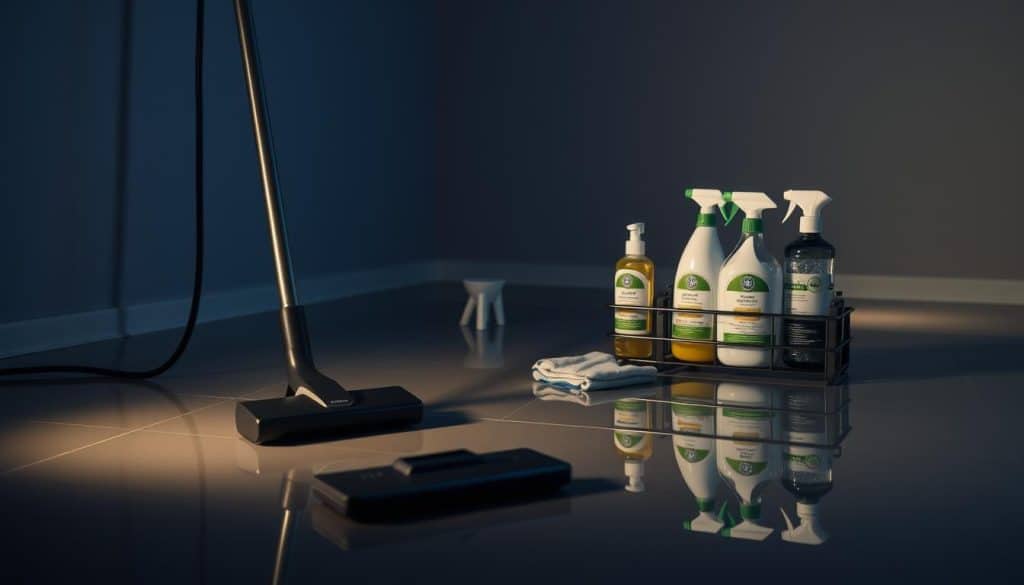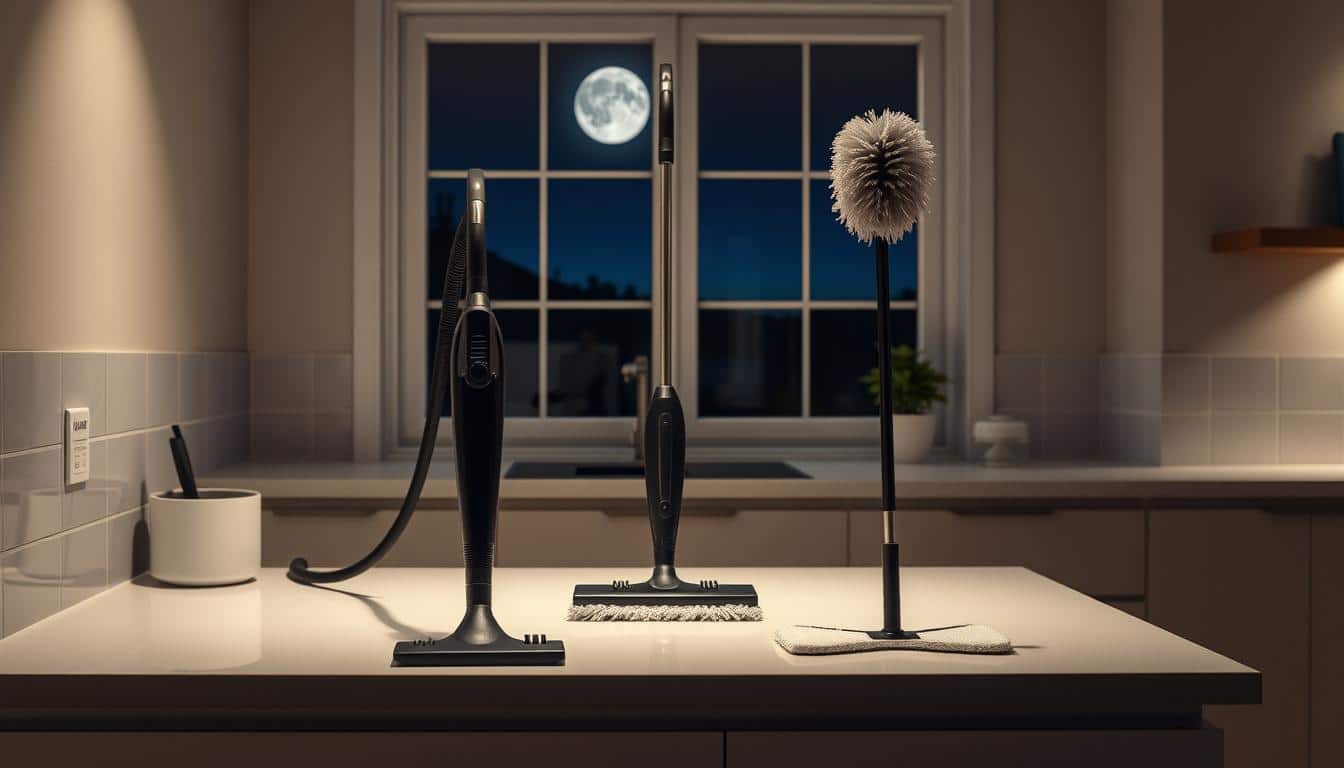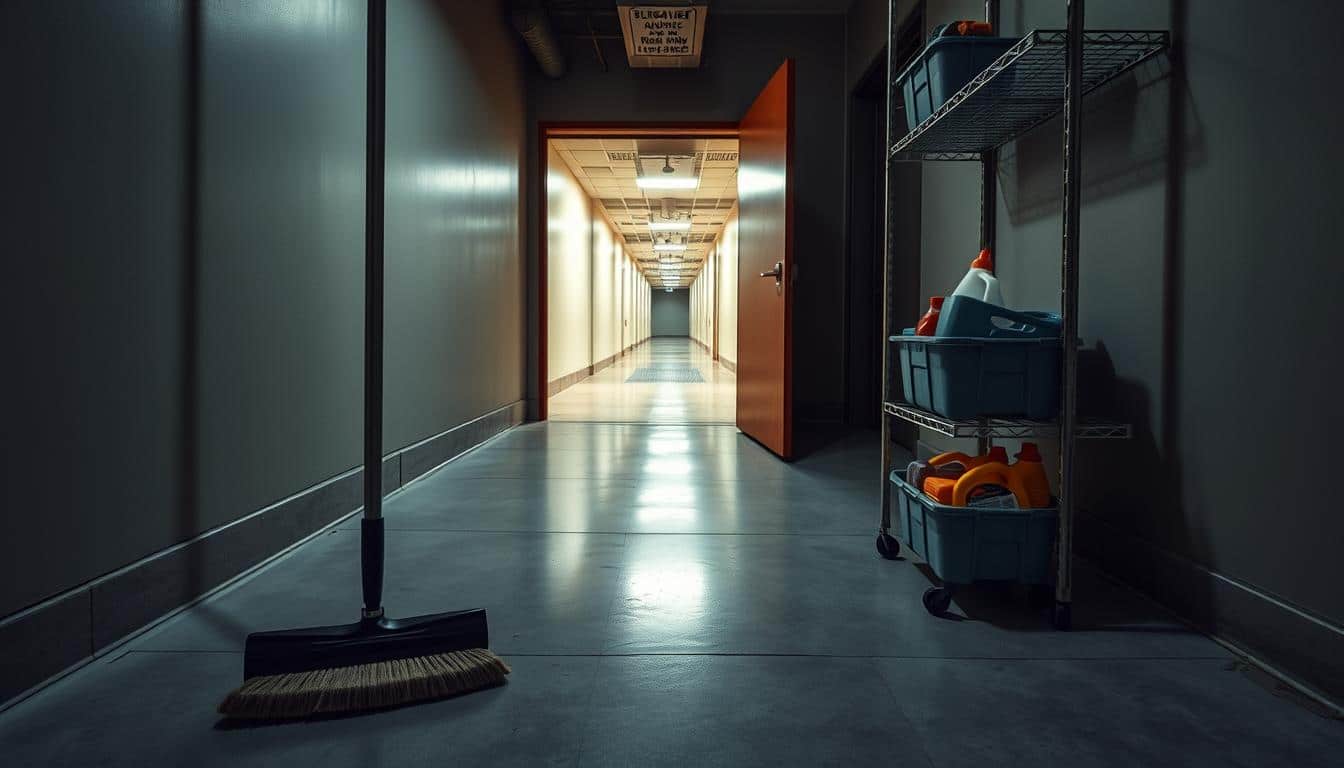In today’s world, we all need effective night cleaning solutions. We want to keep things quiet. Low-noise cleaning tech helps maintain peace while ensuring areas are clean. Quiet vacuum cleaners, like advanced robot vacuums, are at the forefront. They cut down on noise levels during cleaning. Using these tools improves the cleaning experience. It also helps those around sleep better. With low-noise cleaning methods, you can clean quietly, avoiding loud noises.
The Importance of Low-Noise Cleaning for Efficient Night Cleaning
Low-noise cleaning is vital for keeping places clean at night while keeping things quiet. It’s more than just convenience; it creates peace in places where people live together. By reducing noise, families can clean whenever they like without ruining sleep.
Benefits of Low-Noise Solutions
Using low-noise cleaning methods has many perks, especially in busy cities. These benefits include:
- Less noise at night, so everyone sleeps better.
- Keeping places quieter helps everyone relax more.
- People are happier when cleaning fits into their schedules.
Enhancing Sleep Quality
Noise greatly affects how well we sleep. Loud cleaning can interrupt rest for many. Quiet cleaning helps everyone sleep better by:
- Lowering noise pollution in homes.
- Making a relaxing atmosphere for better sleep.
- Letting you clean at night without waking up the family.
Why Choose Robot Vacuums for Quiet Night Cleaning?
Robot vacuums are a big help for keeping your house clean, especially at night. They are not as loud as regular vacuum cleaners. This makes them perfect for cleaning without making too much noise. They’re great if you live with others or have kids, ensuring everyone sleeps well.
These vacuums bring quiet cleaning solutions to your home. They smartly move around your home on their own, making cleaning easy. You can even set a cleaning schedule. This means your house can be cleaned without disturbing your regular activities or sleep.
Key Features of Quiet Cleaning Appliances
Looking for quiet cleaning tools? It’s important to know what makes them great. Quiet robot vacuums are designed to operate softly. This means they’re perfect for use at night. They clean without breaking the peacefulness of your home.
Decibel Levels Explained
Decibel levels are key in finding quiet appliances. Quiet robot vacuums usually stay below 50 decibels. That’s quieter than a normal talk. For instance, the Zoozee Z70 is at just 47.8 decibels. Meanwhile, the Enther C200 is under 55 decibels. Their quiet nature makes them ideal for night time use without disturbing anyone.
Schedule Setup for Night Cleaning
Scheduling is a handy feature of robot vacuums. It lets users pick the best time for cleaning, usually when it’s quiet. With devices like the Zoozee Z70, you can set it up using its Wi-Fi app. This means you can plan cleans without them getting in the way.
How Low-Noise Cleaning Technology Works
Low-noise cleaning technology leads in making night cleaning efficient. It uses smart design to work quietly but still strong. Brushless motors cut down on friction and noise, making them run smoother and quieter.
This tech has advanced suction that cleans well but stays quiet. It keeps things clean at night without making much noise. Sound-dampening materials help lower noise even more, perfect for night use.
Best Quiet Robot Vacuums for Nighttime Cleaning
Finding the perfect robot vacuum can make cleaning at night much more pleasant. The top silent models do a great job without waking anyone up. They come with special features for those who want to clean while others sleep.
Top Picks for Effective, Silent Operation
- 3i-S10 Ultra: This model has the world’s first WaterRecycle™ system that cleans wastewater on its own. It’s powerful, picking up dust and hair well, and stays quiet at night.
- Roborock S7: It has a smart motor that adjusts suction power and uses Sonic Mopping to clean floors. In Quiet mode, it keeps the noise down to 65 dB, so it’s great for any surface without being loud.
- Ecovacs Deebot T8 AIVI: It smartly avoids obstacles and can clean for up to 3 hours, perfect for big areas. With a 67 dB noise level, it’s very quiet for nighttime cleaning.
Comparative Analysis of Features
Comparing these robots highlights their different strengths:
- Noise Levels: The Roborock S7 is quieter at 65 dB, compared to the Deebot T8 AIVI’s 67 dB.
- Battery Life: The Deebot T8 AIVI lasts up to 200 minutes, better than the Roborock S7’s 180 minutes.
- Height and Accessibility: Deebot T8 AIVI fits in tighter spots at 9.3 cm tall, less than the Roborock S7’s 9.65 cm.
- Suction Power: The Roborock S7’s 2,500 Pa suction beats the Deebot T8 AIVI’s 1,500 Pa, cleaning better on all surfaces.
Maintaining Efficiency During Night Cleaning
To get the best out of night cleaning, you need a good plan and smart tactics. Making cleaning schedules that aim to keep things quiet but clean is key. These plans should spot when fewer people are around to do the work without bothering others.
Optimizing Cleaning Schedules
Here’s how to make a top-notch cleaning plan:
- Figure out when it’s busy and when it’s not.
- Set times for different cleaning jobs.
- Think about the area’s layout to make moving and cleaning easier.
With a solid plan for cleaning, work done at night becomes much more efficient.
Choosing the Right Cleaning Products
Picking the right cleaners is key to efficient night cleaning. Choose products that are both green and quiet to keep the area safe and clean. Here are some tips:
- Use detergents that won’t harm the environment.
- Pick solutions that don’t need rinsing to save time.
- Choose products that don’t smell strong for better air inside.
These choices help make night cleaning smooth, effective, and low on disturbances.
Maximizing Quietness During Cleaning
Making your vacuum cleaner quiet significantly improves how you clean, especially at night. By keeping up with vacuum maintenance and using the right settings for different floors, you can clean well without much noise.
Regular Maintenance for Quiet Performance
Keeping your vacuum maintained is key to keeping it quiet. Simple steps like cleaning filters and changing bags when they’re two-thirds full can make it much quieter. Dirt buildup makes the motor work harder and noisier. So, having a regular check-up schedule helps keep it working quietly and for longer.
- Replace bags when they are two-thirds full to prevent decreased performance.
- Thoroughly dry washed filters to avoid mold growth.
- Ensure all filters, including pre-motor and post-motor, are clean for efficient operation.
Adapting to Different Floor Types
Changing the suction strength based on the floor type helps control the noise. Modern vacuums have settings for different surfaces which helps. For hard floors, using a lower suction keeps things quiet while cleaning well.
- Utilize higher suction for carpets when a thorough clean is needed.
- Lower suction levels are ideal for minimizing noise in quiet environments.
- Regular maintenance enhances the quiet operation during these adjustments.
Considerations When Purchasing a Quiet Vacuum
When shopping for a quiet vacuum, you have a few things to consider. First, think about the quiet vacuum features you need. Try to find models that are quiet but still clean well. The balance between noise vs. performance is key for good, quiet cleaning.
Next, look at battery life. A good vacuum should last long enough to clean your space without needing to recharge often. Also, consider how easy it is to maintain. Vacuums with easy-to-reach parts are simpler to keep running smoothly.
Don’t forget to check out budget-friendly options that still perform well. While high-end models have more features, many affordable vacuums do a great job too. Comparing different vacuums carefully can help you make the best choice based on features, noise level, and price.
Tips for Effective Night Cleaning
Planning your night cleaning is key. You should know which spots need cleaning and the best time to do it. Figure out your home’s busy areas to clean smarter, not harder. Using smart timing can boost how much you get done without causing a stir.
Prioritizing Areas for Cleaning
Choosing the right places to clean at night is important. Here’s what to keep in mind:
- High-traffic zones like kitchens and living rooms, where messes are likely to accumulate.
- Bathrooms, as they require regular attention for hygiene and odor control.
- Bedrooms, focusing on dusting and vacuuming to maintain an allergen-free space.
Smart Scheduling Strategies
Improving your cleaning schedule at night makes a big difference. Try these tips:
- Plan cleaning sessions during times when the household is least active, ensuring minimal disturbance.
- Utilize programmable devices to automate cleaning tasks, adapting schedules based on everyone’s routine.
- Consider rotating cleaning tasks to avoid overwhelming workloads on any single night.

Integration of Low-Noise Cleaning in Commercial Settings
In commercial settings, low-noise cleaning strategies are vital. They keep the workplace productive. Night cleaning keeps spaces clean without disrupting the day’s work. This is done using special equipment and methods.
Low-noise cleaning lets cleaners work after hours without bothering late workers. They refine cleaning methods to reduce noise. This way, businesses maintain both cleanliness and quiet.
Key components of this integration may include:
- Regular staff training on low-noise cleaning methodologies.
- Selection of equipment specifically engineered for quiet operation.
- Strategic scheduling to take advantage of quieter times at night.
Conclusion
Switching to quieter cleaning tech changes the game for homes and work places. Robot vacuums and smart cleaning methods ensure things stay clean without noise. This not only makes places peaceful but also helps people sleep better and feel well.
Using quiet cleaning tools keeps the night peaceful too. Picking the right machines and planning when to clean can make any place spotless and calm. Now, having a clean space without the loud noises of old cleaning gear is totally possible.



